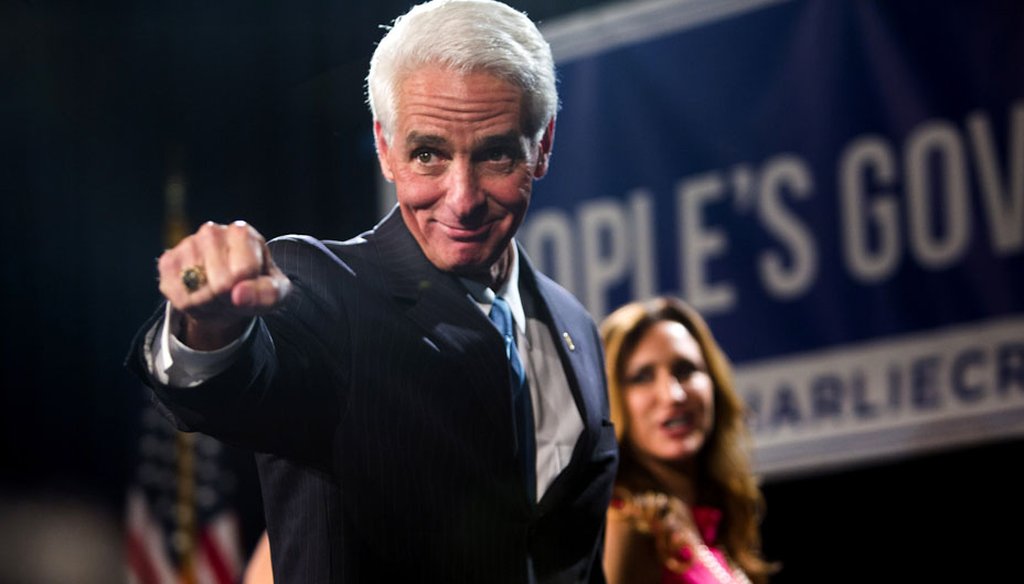Get PolitiFact in your inbox.

Former Gov. Charlie Crist and his wife, Carole, leave the stage in St. Petersburg after his concession speech on Nov. 4, 2014. (Tampa Bay Times photo)
Former Gov. Charlie Crist wasted little time after U.S. Rep. David Jolly announced a run for Senate, suggesting that he may be return to the campaign trail to run for Jolly’s House seat.
On July 21, 2015, Jolly joined a crowded field vying for the Republican nomination for the seat being vacated by presidential candidate Marco Rubio. His 13th congressional district seat faces an overhaul. The Florida Supreme Court has ruled eight districts, including the one Jolly currently represents, must be redrawn to comply with voter-approved fairness guidelines.
Any changes would likely make the seat lean more Democratic, and Crist took to Twitter to say he would run for Congress in 2016 if the new district includes Democratic-leaning St. Petersburg, his home since childhood.
"If the new congressional map includes my home, I intend on running to serve the people again," Crist wrote the afternoon of July 21. The seat already has a Democratic challenger in St. Petersburg native Eric Lynn, a former adviser to the Secretary of Defense.
While this wasn’t an official declaration of his candidacy, Crist is no stranger to Florida campaigns. He was governor from 2007 to 2011, following years as a state senator. He also served as education commissioner and attorney general.
He lost two U.S. Senate campaigns, once to Bob Graham as a Republican in 1998 and once to Rubio, who defeated Crist in the 2010 GOP primary. Crist switched affiliations in that race, becoming an Independent and losing to Rubio in the general election. He switched parties again for the 2014 gubernatorial campaign, registering as a Democrat in what proved to be a losing effort against Gov. Rick Scott.
The Crist chronicles
With such a long career in Florida politics, Crist has a lengthy PolitiFact scorecard:
He has become well known (and often criticized) for his ever-changing stances on the issues. We’ve put him on our Flip-O-Meter several times over the years. Here are our rulings on some of his positions:
On support for the Affordable Care Act (Obamacare): While Crist initially supported repealing the law as governor, his opinions changed over his subsequent campaigns. Wanting to keep the law while running for another term earned him a Full Flop.
On support for same-sex marriage: After voting for a ban in his first gubernatorial campaign, Charlie Crist now backs same-sex marriage. We rated this a Full Flop.
On adoption by gay couples: During his 2006 race for governor as a Republican, Crist repeatedly supported the state’s ban on gay parents adopting, but that changed once he became an Independent. By the time he was a Democrat, he fully supported adoption, a Full Flop.
On oil drilling off Florida’s coast: Crist has been against drilling, although he did wobble in 2008 by suggesting it could be discussed. Ultimately he went back to his original position, so we rated this No Flip.
On the economic stimulus: Crist initially supported the stimulus when it was passed in 2009 before softening his support of it in 2010 in an attempt to win the Republican primary for U.S. Senate. Now he supports it again. We called that a Half Flip.
There also have been dozens of statements by and about Crist. Here’s a selection of some of the ones we rated on the Truth-O-Meter:
The recession and economic turnaround
Crist’s position on the federal stimulus has come up many times since 2009. During the 2014 campaign he disagreed with Scott’s condemnation of the package, saying that if Crist had refused the money, it "would have led to the firing of 20,000 teachers."
It’s difficult to pinpoint the exact number of teachers who would have been laid off statewide, since districts would have had discretion in how to handle their own budget cutting. The Education Department did identify 19,166 full-time equivalent jobs -- not just teachers -- affected by the stimulus money. We rated the statement Mostly True.
And while the Great Recession was in full swing during Crist’s term, he took credit for overseeing the start of Florida’s recovery. He told CNN’s Candy Crowley the "turnaround started at the end of my term."
During Crist’s last year in office, Florida’s economy experienced notable gains in personal income and industrial production, and more marginal improvements in the unemployment rate and in payroll employment. But GDP didn’t grow again until Scott took office.
Economists said he deserved some credit for the economic turnaround because he accepted federal stimulus dollars, but they added a lot of the recovery was beyond any single state’s control. We rated Crist’s statement Half True.
Costs and benefits
Crist made mention of his record as governor while trying to win back the job in 2014. One positive while he was in office, he said, was that "we cut property taxes for seniors and our middle class."
Crist supported increased homestead exemptions for seniors, although only those with low incomes. He also supported tax cuts for property-owning residents, though not an undefined "middle class." Voters decided on both issues with constitutional amendments, and the state Legislature did its part by passing bills that Crist signed. We rated Crist’s statement Mostly True.
His opponents attacked Crist’s record, with the Republican Party of Florida alleging the Democratic challenger "voted against raising the minimum wage."
It’s not that Crist voted on the issue while he was in the Legislature: He was at a 2004 meeting of business advocacy group Enterprise Florida, and there was a unanimous voice vote expressing the organization’s opinion against raising the minimum wage. Other than that, we couldn’t find any evidence of Crist publicly opposing or supporting minimum wage increases, until his recent campaign. We rated the statement Half True.
Crist squarely opposed Scott on the divisive subject of Medicaid expansion under the Affordable Care Act. During a 2014 gubernatorial debate, Crist said that if Florida expanded Medicaid, "some studies indicate it would create about 120,000 jobs."
A Florida Hospital Association study did predict that many, but that group supported the expansion -- another study, for example, put the figure as low as 10,000. Crist cherry-picked the study with the highest statistic and omitted that it was done for a pro-expansion group. There’s no true consensus on how many jobs would come to Florida. We rated Crist’s statement Half True.
Our Sources
See individual fact-checks for complete source lists.
































